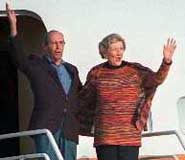[Editor’s note: This article has been corrected since it was originally published.]

No. 1
Richard M. and Helen DeVos
Grand Rapids, Mich., $1,018,800 
Richard M. DeVos, 72, is the founder of Amway Corp. Helen DeVos is a philanthropist.
When Amway founder Richard M. DeVos and his wife Helen each gave $500,000 to the GOP in April 1997, the payback came from the two most powerful people in Congress. In July, Senate Majority Leader Trent Lott and House Speaker Newt Gingrich slipped a last-minute provision into the hotly contested compromise tax bill that granted the DeVos family’s company, Amway, a tax break on its Asian branches. The break, which Amway shared with shared with four other companies, totaled $19 million.
Shortly after the DeVoses’ $1 million gift, Amway lobbyists hired Bob Packwood, the former Republican senator who resigned amid sexual harassment allegations in 1995, to petition the Senate on the provision’s behalf. One of Packwood’s targets was Lott, whose staff counsel on taxes and international trade, Rolf Lundberg, once served on Packwood’s Senate staff. Meanwhile, Amway lobbyist and former Treasury official Roger Mentz convinced the Treasury Department — at Gingrich’s urging, according to the Wall Street Journal — to go on record saying it did not oppose the tax break. And when the bill went to the White House, Clinton signed it without using his line-item veto power (since ruled unconstitutional by the Supreme Court) to strike the provision.
The DeVoses have a long history of GOP giving. Last fall, when Beltway pundits tut-tutted over alleged fundraising calls from the Clinton White House, Democrats, according to The Associated Press, found evidence of similar fundraising calls in Ronald Reagan’s presidential papers — including one to DeVos, then RNC finance chairman. DeVos has retired from the family business, but his son Dick, current Amway president, and daughter-in-law Betsy, chair of the Michigan Republican State Committee, carry on the family’s blunt approach to political giving.
“I know a little something about soft money, as my family is the largest single contributor of soft money to the national Republican Party,” Betsy DeVos wrote in an op-ed for the Capitol Hill newspaper Roll Call. “I have decided, however, to stop taking offense at the suggestion that we are buying influence. Now I simply concede the point. They are right. We do expect some things in return.
“We expect to foster a conservative governing philosophy consisting of limited government and respect for traditional American virtues. We expect a return on our investment; we expect a good and honest government. Furthermore, we expect the Republican party to use the money to promote these policies, and yes, to win elections. People like us must surely be stopped.”
But Amway’s influence isn’t always so apparent. The direct-sales giant (its vast inventory includes such brand names as Nestlé and Wonderbra) has a famously zealous sales force of an estimated 750,000 “distributors” in the United States, all of whom are encouraged to recruit others to the company. This ever growing network of Amway devotees, heavily influenced by the company’s dual themes of Christian morality and free enterprise, donates money and operates like a private political army.
Take Amway distributor Rep. Sue Myrick (R-N.C.). As Mother Jones reported in 1996 (“She Did it Amway,” September/October), Amway heavyweight Dexter Yager (see sidebar) used the company’s extensive voice-mail system to rally hundreds of Amway distributors into giving a total of $295,871 to Myrick’s 1994 campaign.
And since being elected, Myrick has maintained her close ties to Amway and Yager. During the 1997-98 election cycle she has raised $100,000 from Amway sources, most notably through fundraisers at the homes of big distributors. A memo obtained by Mother Jones that Myrick sent to Yager, who in turn passed it along to the distributors in his “downline” — his chain of sales recruits — illustrates how much Myrick has gained from her ties to Amway. In the note, Myrick asks Yager to pass along an invitation to a November 11 event last year: “Would you please fax this info to your downline and encourage anyone in the area to attend?” FEC filings for the period show that Myrick received more than $20,000 from Amway distributors around the time of the fundraiser. The following April, around the time of a second fundraiser aimed at Amway members, Myrick fetched more than $35,000.
Federal election laws are unclear about whether such encouragement is legal. What is clear is that it’s effective, and like Myrick, Reps. Bill Redmond (R-N.M.), Heather Wilson (R-N.M.), and Jon Christensen (R-Neb.) also received Amway funding this year.















